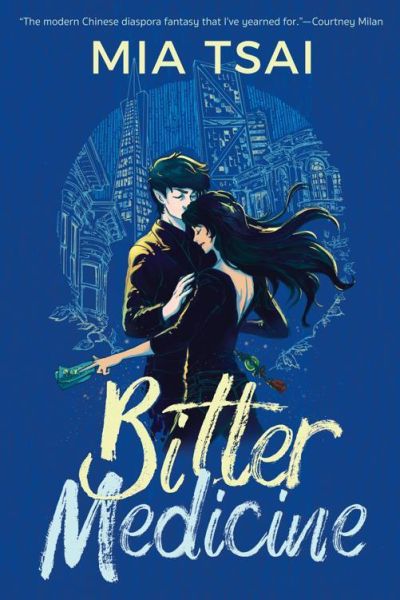Mon Amou
Bitter Medicine
By Mia Tsai

11 Nov, 2022
Mia Tsai’s 2023 Bitter Medicine is a stand-alone urban fantasy.
Elle is a purveyor of arcane glyphs; her occupation brings her into contact with many members of the world’s diverse supernatural community. She herself is a descendant of Shénnóng, the Chinese god of medicine, and is comfortable rubbing shoulders with such entities. One customer, however, has caught her attention. He’s attractive.
French elf Luc is close-mouthed about his work. Whatever it is he does for a living, it involves violent encounters for which Elle’s glyphs are the difference between life and death. But Elle is precious to Luc for reasons other than professional utility. Just as Elle is fond of Luc, Luc is fond of Elle.
However … they are both inarticulate, in part due to shyness, in part due to other complications. Daring to talk clearly and unambiguously to each other would seem to be an easy first step, but neither finds it so.
For one thing, Elle and her older brother live under assumed names. The siblings barely survived attacks from their homicidal younger brother. They’ve learned to be cautious. Were Elle to reveal any of this to Luc, she might be sending him to his death at her younger brother’s hands.
Luc for his part cannot talk about his work because his boss Oberon took the precaution of binding Luc with a geas. Luc is the ideal field agent; he can neither refuse orders nor talk about them. This may be for the best, as some of Oberon’s orders would not bear the light of day.
How convenient for the couple that Elle’s fanatical brother and Luc’s latest target are the same person. Provided, of course, that Elle does not conclude that Luc’s awkward courtship wasn’t in service of using her as bait for her brother. That might be a problem if Luc and Elle manage to survive what’s coming at them.
Oberon isn’t just the sort of bad boss who would use the fact that a naïve young man let slip his true name to bind that person into involuntary servitude. He is the sort of self-deceiving bad boss who convinces himself that by forcing Luc to do that which Luc is unwilling to do, he is doing Luc an enormous favour. Have fun chatting in comments about bosses like Oberon that you might have had in the past.
Rather atypically for urban fantasies (and despite the fact that Oberon seems to operate with impunity), there does seem to be a law enforcement system (of sorts). It’s true that its agents are casual about causing collateral damage and that some citizens are more equal than others, but it’s nothing out of the ordinary for actual law enforcement in the real world.
When starting to read this book, I was worried that the entire novel would consist of painful conversations in which both participants methodically misinterpret every clear expression of attraction. Is this realistic1? In any case, Elle and Luc come from entirely different communities so it’s not too surprising that they have difficulties communicating.
[Yeah, it is a bit weird that Wednesday’s book and today’s both feature smart people who are articulate except when romance is involved. Either the trope is super-useful to writers or this is like that week where all the books I read involved protagonists who lost one hand in dynastic disputes.]
The pacing surprised me. There’s the temptation in stories like this to bring down the curtain just after a culminating violent confrontation. No focus on uncomfortable aftermaths (recovering from major injury or PTSD, the difficulties of communicating clearly and establishing mutual goals and boundaries, the ever-popular meeting the partner’s family for the first time). Bitter Medicine is as much about aftermaths and consequences as it is about dramatic adventures.
This isn’t really my sort of thing, so I am bit surprised to discover I enjoyed it. Perhaps you will as well.
Bitter Medicine is available here (Amazon US), here (Amazon Canada), here (Amazon UK), here (Barnes & Noble), here (Book Depository), and here (Chapters-Indigo).
1: I mean, by definition very few people are descended from people who failed to reproduce, whether because they could not pop the question or for other reasons. Surely after billions of years of natural selection, modern entities should be marvels of reproductive efficiency in every possible way?
